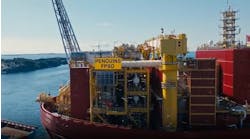UK energy crisis underscores need for North Sea oil and gas
The current UK energy crisis illustrates the importance of fossil fuels, particularly oil and gas.
Over the past month, much of Britain has seen both shortages of gasoline and natural gas. The problems with obtaining transportation fuels seem to have been caused by breakdowns in the UK transportation and delivery systems, rather than a problem with crude oil supply.
But the shortages of natural gas are real, and in recent weeks natural gas prices have soared, with wholesale prices rising to more than three times the level they were at the start of the year. The potential ripple effect of these price increases is huge – especially as winter approaches – since about 86% of British homes use gas for heating, and more than one-third of electricity supplies come from gas-fired power plants.
Analysts have attributed skyrocketing prices to a ‘perfect storm’ of factors, including depleted European stocks after a prolonged winter; delayed maintenance by domestic gas field operators; lower gas supplies from Russia; and strong demand for liquefied natural gas in Asia and Latin America.
The tightening of the European gas market has huge implications for the UK power grid, nearly half of which is supplied by gas-fired power plants. The use of gas to create electric power has been ramping up in recent months due to another set of problems in the UK power system. Aging nuclear power plants have been forced to undertake unplanned outages for maintenance; a main power cable used to import electricity from France had to be shut down due to a fire; and power production from the UK’s 11,000 wind turbines has slowed dramatically as UK weather has been unusually calm, with some of its lowest wind speeds seen since the early 1960s.
Taken together, the current UK energy crisis underscores the need for future E&P from the North Sea, and the importance of fossil fuels. And Britain remains an attractive proposition for offshore oil and gas investments, according to Offshore’s Editor-Europe Jeremy Beckman. He recently attended a panel session on the future of the UK North Sea at the SPE’s Offshore Europe virtual event last month, and his analysis starts on page 14. The speakers at that panel did note, however, that securing approval for new projects will hinge on adopting stricter emissions controls, supported by the adoption of `cleaner’ power sources for production and other facilities.
While operators are looking to ‘green’ their projects, they are also trying to ‘lean’ their projects, to ensure economic feasibility. Authors Richard D’Souza and Shiladitya Basu recently completed a comprehensive study of 10 recent, producing deep and ultra-deepwater field developments in the US Gulf of Mexico. The goal of the larger study, which is excerpted in this issue, was to provide operators and developers with solid benchmark data, and help them assess their cycle times and improve their contracting strategies. Their analysis starts on page 16.




